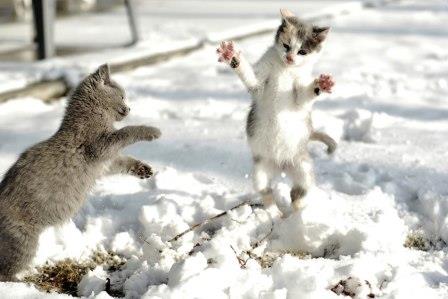WINTER SAFETY TIPS FOR PETS AND COMMUNITY CATS

Exposure to winter's dry, cold air and chilly rain, sleet and snow can cause chapped
paws and itchy, flaking skin, but these aren't the only discomforts pets can suffer.
Winter walks can become downright dangerous if chemicals from ice-melting agents
are licked off of bare paws. To help prevent cold weather dangers from affecting
your pet's health, please heed the following advice from the experts at: https://www.aspca.org/pet-care/general-pet-care/cold-weather-safety-tips
Although we rarely have freezing weather or snow in and around Phoenix, other parts
of Arizona do. In many areas, winter is a season of bitter cold and numbing wetness.
Regardless, make sure your four-footed family members stay safe and warm by following
these simple guidelines.
Keep pets sheltered
Keep your pets inside with you and your family. Under no circumstances should pet
cats be left outdoors, even if they roam outside during other seasons. Dogs
are happiest when taken out frequently for walks and exercise, but kept inside the
rest of the time. Don't leave pets outdoors when the temperature drops.
If your dog is outdoors much of the day for any reason, they must be protected by
a dry, draft-free shelter that is large enough to allow them to move comfortably,
but small enough to hold in body heat. The floor should be raised a few inches from
the ground and covered with cedar shavings or straw. The doorway should be covered
with waterproof burlap or heavy plastic.
Pets who spend a lot of time outdoors need more food in the winter because keeping
warm depletes energy. Routinely check your pet's water dish to make certain the
water is fresh and unfrozen. Use plastic food and water bowls; when the temperature
is low, your pet's tongue can stick and freeze to metal.
Remove common poisons
Antifreeze is a deadly poison, but it has a sweet taste that may attract animals
and children. Wipe up any antifreeze spills immediately and keep it, like all household
chemicals, out of reach. Coolants and antifreeze made with propylene glycol are
less toxic to pets, wildlife and family.
Dogs are at particular risk of salt poisoning in winter due to the rock salt used
in many areas—often when licking it from their paws after a walk. Store de-icing
salt in a safe place and wipe your dog's paws, even after short walks. If your dog
ingests rock salt, call a veterinarian immediately.
Protect outdoor animals
If there are outdoor cats, either owned pets or community cats in your area, remember
that they need protection from the elements as well as food and water. It's easy
to give them a hand.
You can make your own cat shelter quickly and easily with a plastic tub. Heated
animal shelters can be purchased from places like Amazon and more.
Cars are one of many hazards to small animals-warm engines in parked cars attract
cats and small wildlife, who may crawl up under the hood. To avoid injuring any
hidden animals, bang on your car's hood to scare them away and honk the horn before
starting your engine (but look for oncoming traffic first).
ALLEY CAT ALLIES ON PROTECTING FERALS/COMMUNITY CATS IN THE WINTER:
See detailed tips on feeding, making shelters and more by clicking on this link:
Alley Cat Link
|
Shop For Our
Cause
-

|
Send a Cash
Donation
-

|
Visit on
Facebook
-

|
Email
Us
-

|